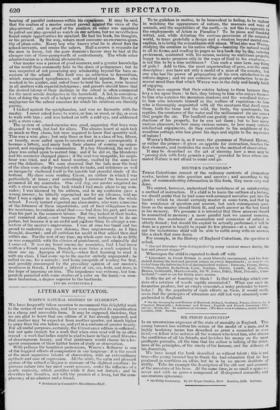LITERARY SPECTATOR.
WHITE'S NATURAL HISTORY OF SELBORNE*.
WE have frequently taken occasion to recommend this delightful work to the notice of our readers, and have even suggested its republication i n a cheap and accessible form. It may be supposed, therefore, that we are glad to learn that one edition of it has already appeared, and that another may be expected from another quarter, not much higher in price than the one before us, and yet in a costume of greater beauty. For all useful purposes, certainly, the CONSTABLE edition is sufficient; but not quite enough for a work that when once read will be so often reread—a work that ladies might be glad to have in their small libraries of drawingroom luxury, and that gentlemen would choose for a fre- quent companion of their lighter hours of study or observation. With perhaps the humblest pretensions, WHITE'S Selborne is one of the happiest efforts of composition in our language : it is the result of the most sagacious talents of observation, with an extraordinary aptitude and ease of expression. All the while, the calm and pleasant genius of the retired collegian is unaware of the slightest exertion : he pursues nature into her most secret recesses, under the influence of a gentle curiosity, which gratifies while it does not disturb ; and he describes her beauties, not with the passion of a lover, but the com- placency of an admirer and a friend.
* Published in Constable's Miscellany—XLV.
To be guileless in motive, to be benevolent in feeling, to be vigilant in watching the appearances of nature, the manners and vvaYs of animals, and the capabilities of. the earth, is not this to approach to P the employments of Adam in Paradise? To be pious and thankful withal, and, while detecting the curious provisions of the animated world, to trace gratefully a design and a wisdom beyond mortal con- ception, is to bring the resemblance still closer. What else, was WHITE, studying the creation in his native village—learning the natural world in all its forms, and reading its pages as in a book day by day, refusing preferment, contented with his means, seeking no ambitious projects-, happy to make progress only in the ways of God to his creatures,— is not this to be a true nobleman ? Can such a man have any thing of guile ? Add to this, the most unpretending of pens, and the most descriptive : you have not only a model of a man of the country, but one who has the power of propagating all his own satisfaction to an infinite degree ; and we can conceive no greater satisfaction to an in- nocent mind than that which WHITE was in the daily and hourly habit of enjoying. Rich men suppose that their estates belong to them because they levy a tax upon them : in fact, they belong to him who enjoys them— to him who watches the mountain shadows and the woodland tints— to him who interests himself in the welfare of vegetation—to him who is thoroughly acquainted with all the creatures that dwell upon them, both the tame and the wild, the birds, the quadrupeds, the reptiles, the creatures of the water and the millionaires (in one sense) that people the air. The landlord can gratify one sense with the pm- ductions of his property, for he can eat them ; but to how many various pleasures, to how many various senses, to how many various intellectual enjoyments, do they contribute to his neighbour of the woodbine cottage, who has given his days and nights to the mysteries of nature !
WHITE'S Selborne is, as it were, the grammar of Natural History, or rather the primer: it gives an appetite for instruction, teaches the first elements, and institutes the reader in the method of observation.
It may be described as the art of showing how a man may be "passing rich with forty pounds a year," provided he lives where ani- mated Nature is not afraid to come and go.


















 Previous page
Previous page